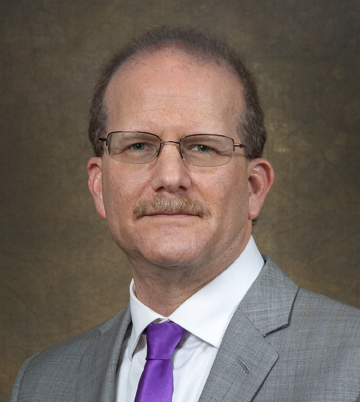The National Institutes of Health launched the “Helping to End Addiction Long-term Initiative,” or NIH HEAL Initiative, in April 2018 to improve prevention and treatment strategies for opioid misuse and addiction and to enhance pain management. The initiative aims to improve treatments for chronic pain, curb the rates of opioid use disorder and overdose, and achieve long-term recovery from opioid addiction.

A team of researchers led by Wayne State University this week received one of 375 grant awards across 41 states made by the NIH in fiscal year 2019 to apply scientific solutions to reverse the national opioid crisis. This $4 million award for the study “Dual-orexin antagonism as a mechanism for improving sleep and drug abstinence in opioid use disorder” will bring together a research team from Wayne State University and Henry Ford Health System to investigate a rigorous treatment method that may offer a new therapeutic approach to reduce opioid addiction relapse.
Mark Greenwald, Ph.D., principal investigator of Wayne State’s grant and professor and associate chair of Research and director of the Substance Abuse Research Division in the Wayne State School of Medicine’s Department of Psychiatry and Behavioral Neurosciences, said insomnia is common in opioid addiction and is a major predictor of potential relapse. Current medications to treat insomnia have limited results on relapse and may produce unwanted side effects.
Often, adjunctive medications — such as clonidine and gabapentin — may be used during detoxification and outpatient treatment to suppress withdrawal symptoms and treat sleep disturbance. However, in those patients who have had these treatments, rates of treatment cessation and opioid relapse are high.
“There are FDA-approved medications for treatment of insomnia, but there is an unmet need for alternatives, especially to aid in preventing opioid addiction relapses,” Dr. Greenwald said. “The Orexin (OX) system plays a key role in sleep and substance use, and offers promise as a potential alternative to other medications currently used to treat insomnia. In animal studies, the FDA-approved insomnia medication and OX1/2 antagonist suvorexant has shown positive impact and has potential as a new treatment method in sustaining opioid addiction recovery.”
Once personnel are hired and trained for the study, the team will enroll approximately 210 individuals who have sought rehabilitative treatment for opioid addiction at the Henry Ford Maplegrove Center, an addiction treatment facility in West Bloomfield, Mich., during a three-year period. In addition to enrollees’ standard-of-care addiction treatment plan, they will be assigned either a placebo, 10 mg of suvorexant or 20 mg of suvorexant before bedtime during inpatient treatment. Once released, they will come to the treatment center one to three times a week for intensive outpatient care and assessment, and will continue study medications as prescribed.
“We strongly value this opportunity for Henry Ford Maplegrove Center to serve as the single enrollment site for the clinical evaluation of a new potential therapeutic approach for opioid use disorder,” said Elizabeth Bulat, M.D., medical director of Henry Ford Maplegrove Center and clinical assistant professor of Psychiatry and Behavioral Neurosciences at WSU. “The hypothesis that sleep disturbance might be a major correlate and/or predictor of relapse is consistent with our clinical observations. If the dual Orexin-antagonist approach promotes sleep maintenance, opioid abstinence and the linkage of these two outcomes, our team and others around the world will have an incredible new treatment option for patients.”
The research team at Henry Ford Health System includes co-principal investigator Timothy Roehrs, Ph.D., director of research, Sleep Disorders and Research Center; Josh Smith, M.D., addiction medicine physician, Henry Ford Maplegrove Center and clinical assistant professor of Psychiatry and Behavioral Neurosciences, Wayne State University; Phillip Cheng, Ph.D., clinical psychologist; and Christopher Drake, Ph.D., bioscientific staff investigator. WSU co-investigators include Samiran Ghosh, Ph.D., biostatistician, and Paul Burghardt, Ph.D., biomarker expert. Dr. Greenwald and Roehrs also recruited two expert consultants: Kenneth Wright, Ph.D., director, Sleep and Chronobiology Laboratory, University of Colorado Boulder; and Christian Heidbreder, Ph.D., chief scientific officer, Indivior PLC, Richmond, Va.
“This grant award from the National Institutes of Health is a wonderful example of what is possible through collaboration and partnership,” said David Rosenberg, M.D., chair of the WSU Department of Psychiatry and Behavioral Neurosciences and the Miriam L. Hamburger Endowed Chair of Child Psychiatry and professor of Psychiatry at Wayne State University’s School of Medicine. “Wayne State University and Henry Ford Health System will be excellent partners on this critical research project.”
“It’s clear that a multi-pronged scientific approach is needed to reduce the risks of opioids, accelerate development of effective non-opioid therapies for pain, and provide more flexible and effective options for treating addiction to opioids,” said NIH Director Francis S. Collins, M.D., Ph.D., who launched the initiative in early 2018. “This unprecedented investment in the NIH HEAL Initiative demonstrates the commitment to reversing this devastating crisis.”
The grant number for this National Heart, Lung, and Blood Institute of the National Institutes of Health award is 1U01HL150551-01.